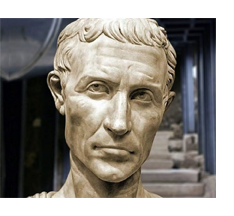One Column Page
and responsive to boot
Pontius Pilate
by T. J. Smith
This article appeared in the
2023 Winter issue of Fulfilled! Magazine

Well, hello all you Cool Cats and Chilly Chicks (Ok, that was a phrase from legendary radio personality Wolfman Jack . . . Ok, Wolfman Jack was a DJ in the 60s-70s . . . a “DJ” was a . . . oh, never mind)
It’s good to be back and thanks to Charles Meek for his enlightening column last issue.
I finally published The Last Semite on my new website (www.tjsmithministries.com) along with my 6th volume of Understanding the Bible for Average Christians, so it was a busy 45 days. The Last Semite has been surprisingly popular. Maria handles all the shipping, and she has been filling orders every week. One order was for a copy of all my books, (Understanding vol. 1-6, The Last Semite, and Kingdom Come). So it’s been nice. [See the ad on page 2 - BLM]
My column this issue is from Understanding the Bible for Average Christians, volume 6, chapter 4. I was studying Pilate’s statement to Jesus of “What is truth?” and wondered why Jesus never answered him. I wrote the chapter about how Pilate answered his own question through his own words. This short chapter sets up the history behind Pilate and helps explain why he was perplexed and struggling with the Jews and Jesus.
Pontius Pilate (from the 1906 Jewish Encyclopedia)1
“Fifth Roman procurator of Judea, Samaria, and Idumæa, from 26 to 36 of the common era; successor of Valerius Gratus. According to Philo (“De Legatione ad Caium,” ed. Mangey, ii. 590), his administration was characterized by corruption, violence, robberies, ill treatment of the people, and continuous executions without even the form of a trial. His very first act nearly caused a general insurrection. While his predecessors, respecting the religious feelings of the Jews, removed from their standards all the effigies and images when entering Jerusalem, Pilate allowed his soldiers to bring them into the city by night. As soon as this became known, crowds of Jews hastened to Cæsarea, where the procurator was residing, and besought him to remove the images. After five days of discussion, he ordered his soldiers to surround the petitioners and to put them to death unless they ceased to trouble him. He yielded only when he saw that the Jews would rather die than bear this affront. Later, Pilate appropriated funds from the sacred treasury in order to provide for the construction of an aqueduct for supplying the city of Jerusalem with water from the Pools of Solomon; and he suppressed the riots provoked by this spoliation of the Temple by sending among the crowds disguised soldiers carrying concealed daggers, who massacred a great number, not only of the rioters, but of casual spectators.
Despite his former experience of the sensitiveness of the Jews with regard to images and emblems, Pilate hung up in Herod’s palace gilt shields dedicated to Tiberius, and again nearly provoked an insurrection. The shields were removed by a special order of Tiberius, to whom the Jews had protested. Pilate’s last deed of cruelty, and the one which brought about his downfall, was the massacre of a number of Samaritans who had assembled on Mount Gerizim to dig for some sacred vessels which an impostor had led them to believe Moses had buried there. Concerning this massacre the Samaritans lodged a complaint with Vitellius, legate of Syria, who ordered Pilate to repair to Rome to defend himself. On the participation by Pilate in the trial and crucifixion of Jesus (see Crucifixion; Jesus of Nazareth).
The end of Pilate is enveloped in mystery. According to Eusebius (“Hist. Eccl.” ii. 7), he was banished to Vienna (Vienne) in Gaul, where various misfortunes caused him at last to commit suicide; while the chronicle of Malalas alleges, with less probability, that he was beheaded under Nero. A later legend says that his suicide was anticipatory of Caligula’s sentence; that the body was thrown into the Tiber, causing disastrous tempests and floods; that it afterward produced similar effects in the Rhone at Vienne; and that, finally, it had to be consigned to a deep pool among the Alps”.
What you just read is from a Jewish viewpoint and, as we know, the winners get to write history. I’m not saying there are lies in this Jewish encyclopedia, I’m just saying there are always presuppositions to everything. This also holds true for the Christian church. Catholics and Protestants believe in the same Savior, but there are numerous differences that keep us from unity. How much more so between Jew and Christian. So, here is another article from the Encyclopedia Biblica from 19022:
Pilate, Pontius – 5. Legends.
Pilate has won notoriety through his connection with the trial and sentence of Jesus (Mt 27:2 f; Mk. 15:1f; more fully in Lk. 23:1f. Jn. 18:28f. adds much to the Synoptics accounts.) See further, Roman Empire.
Of Pilate’s end nothing is known. Before he reached Rome Tiberius was dead (Jos. Ant. xviii 4.2). Various traditions were current. Eusebius (Chron and HE 2:7) asserts, on the authority of unnamed Greek or Roman chroniclers, that he fell into such misfortunes under Caligula that he committed suicide. In the apocryphal Mors Pilati, his suicide follows upon his condemnation to death by Tiberius for his failure to save Jesus. His body was cast into the Tiber; but evil spirits disturbed the water so much that it was carried to Vienna (Vienne) and cast into the Rhone, and after various vicissitudes, ended in the recesses of a lake on Mt. Pilatus, opposite Lucerne (for this legend and its origin, see Müller, Pont. Pit. 82 f.; Ruskin, Mod. Paint. 5:128). In the apocryphal Παράδοσις Πιλατου it is related that Tiberius called Pilate to account for the crucifixion of Jesus and condemned him to death; and both he and his wife died penitent, and were assured of forgiveness by voice from heaven (see Tisch. Evang. Apocr. 449 f.). According to other accounts, Pilate's execution occurred under Nero (so Malalas, ed. Dind. 250 f.; and authorities quoted by Schürer. op. cit. 88 n.). The tendency of the tradition to represent both Pilate and his wife as embracing Christianity is easily understood, and is in contrast with the unsympathetic estimate of later times (cp Tertull. Ap. 21. jam pro sua conscientia Christianus, “already in conviction a Christian,” at or immediately after Jesus’ death; Gosp. of Nic. 2; Orig. Hom. on Mt. 35; Stanley, East. Ch.) Tradition gives the name of Pilate’s wife as Claudia Procula or Procla, and by some she has been identified with the Claudia mentioned in 2 Tim. 4:21 [Underline added]
Whether the underlined comments are true, it is interesting to consider. Claudia told Pilate about the dream she had that Jesus was innocent. We know she was considered a Roman Princess, being the granddaughter of Emperor Augustus. We read this in Matthew 27:19:
While Pilate was sitting on the judge’s seat, his wife sent him this message: “Don’t have anything to do with that innocent man, for I have suffered a great deal today in a dream because of him.”
Keep these dynamics in mind as we ponder how Pilate wrestled for truth that day. That’s it for this issue. Next issue, I will present the chapter “What is Truth” to show how Pilate got his answer.
Before I sign off, I want to address a Facebook issue that seems to be getting worse among the preterist groups. Recently I posted a chapter from my WordPress blog (victorynow2020) and posted it on FB. It was on the use of “and this is” by John. The thrust of the article was that every time the phrase was used, there was a cool blessing tied to Christ and the Kingdom. Here are three verses showing this:
John 17:3 “and this is eternal life, that they know you, the only true God, and Jesus Christ whom you have sent.”
1 John 2:25 “and this is the promise that he made to us—eternal life.”
1 John 5:4 “For everyone who has been born of God overcomes the world. And this is the victory that has overcome the world—our faith.”
The second line of my post reads: “This assumes the expression was based on the actual Greek words with none added for clarity”—I even stated my conditions. I posted a link on Facebook and within five minutes I got this reply: “Way too many bad assumptions. The New Testament was not originally written in Greek. It was translated to Greek from Aramaic. Who the author is does nothing to change what was written.”
What struck me as odd was he never mentioned the content of the chapter, and there was no recognition that I started the article with “this assumes.” Only an immediate confrontation. Ironically, his reply also “assumes” every book in the New Testament was written in Aramaic. Further, if a particular author was the only one to use this phrase, then yes, it absolutely affects the meaning of what was written. A textual critic would argue the same author wrote the Gospel of John, the 3 Epistles of John, and The Revelation, thus strengthening the concept that Lazarus (John Eleazer) wrote all 5 works.
I tried to converse with the person, attempting to focus him back to the content and subject matter, but it got so out of hand I finally stopped replying. I get tired of this type of passive aggression from those just wanting to blast something out there before even reading the article, replying with a rebuttal as long as the original post. As if insulting me will create a desire to read their position.
As believers, we need to stop attacking and posting replies to things that miss the point. I know I’ve done it and have made enemies, so I guess that when the shoe is on the other foot, I don’t like it so much! Ha. Tim Martin and I had a few heated replies on another topic, but somehow in the middle of sparring, the energy changed, and we suddenly found respect for each other. I really enjoyed his book Beyond Creation Science which I read back in 2013. Although I don’t agree with everything in the book, we were able to connect on that and his rural Montana lifestyle.
Let’s just practice civility and respect. If you don’t like a post, move on. It does no good to argue with each other. Better yet, as I replied to this poster, go write your own book. Till next time! TJ
1. https://jewishencyclopedia.com/articles/12147-pilate-pontius
Comments:
Your honest review will help others in their search for truth. If you must leave a negative review please be gracious.
Rather, speaking the truth in love, we are to grow up in every way into him who the head, into Christ . . . .
(Ephesians 4:15)
We use "Disqus" commenting software. If you are not familiar with "Disqus," click here for more information. You don't need a Disqus account to post comments, however, without an account you won't be notified if someone responds to your post.
 Fulfilled
Fulfilled